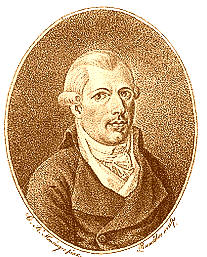|
|
|
|
Adam Weishaupt (1748-1811) A master of the Illuminati |
 |
|
Weishaupt was a professor of Canon (Church) Law at Ingolstadt, in the German state of Bavaria (Southern Germany) and came from a family of Jews who had converted to Catholicism. In the 1770s he became involved with Freemasonry, though he remained sceptical of some of its more grandiose claims -- countering them with some grandiose designs of his own for a general reformation of government, religion, and science, in the name of "enlightenment," by which he meant an informed scientific reason without "superstition" or priestcraft. His followers originated largely from the anti-church, anti-royalist students of his university. Though the term "Bavarian" was attached to his abortive Order, Weishaupt always had global aspirations and would never have limited his group by such a restrictive geographical designation. He saw himself as the leader of "The Illuminati" -- the Illuminated Ones -- an elite circle of intellectuals learned in the most esoteric mysteries of the universe, and the rightful heirs to the mysteries and secret societies of the ancient world. Weishaupt was fascinated by the pyramids of Egypt, particularly the Great Pyramid of Giza, believing it to have been an ancient temple of initiation into the Mysteries (which it very well might have been, as some modern scholar shave come to believe.) This is the primary reason Weishaupt's Illuminati used as their symbol the pyramid, crowned by the All-Seeing Eye of God (a version is located on the back of the U.S. dollar bill.) The pyramid was also a symbol of the heirarchy of initiation, and the Illuminati were structured along the lines of a pyramid, with low-level members forming the broad base and the higher initiates a small inner circle, or the capstone of the structure. The Illuminati were surprisingly successful for a time, taking as it did the best of Masonry (of which Weishaupt was an avid student, but also a cynic) and coloring it with Weishaupt's personal charisma and world-spanning ambitions to reform human society. By the 1780s the order had spread across Europe, from Russia to Portugal; a chapter (the Columbian Lodge) was even formed in New York City. Weishaupt's internationalist ambitions did not sit well with all members of his Order. Two native German members, Johann Herder and Johann Fichte, found themselves opposed to Weishaupt's globalismas they were working for a unified and independent German state. Germany at this time was still a collection of independent small principalities and kingdoms, sharing a common language and culture, but divided by petty political differences and economic interests. In 1784 the King of Bavaria, having got wind of the Illuminati, banned the Order and Weishaupt found himself fired from his position at the University, and forced to flee on horseback through several towns until he finally fouond refuge in Gotha. Though his Order continued for some time, and may have gone underground in places, it essentially had been been broken. Weishaupt continued to inspire other members and students of occultism, but public opinion wa against him.. He remains a highly controversial figure to this day, often serving as a symbol of "evil" for conspiracy theorists from all across the political spectrum. For the most part, rightists see the Illuminati, with its internationalist, anti-royalist and anti-traditionalist platform, as a continuing threat to what they perceive to be traditional cultural order. However, it would appear that from a more-or-less objective viewpoint, the influence of Weishaupt has been greatly exaggerated. |
|